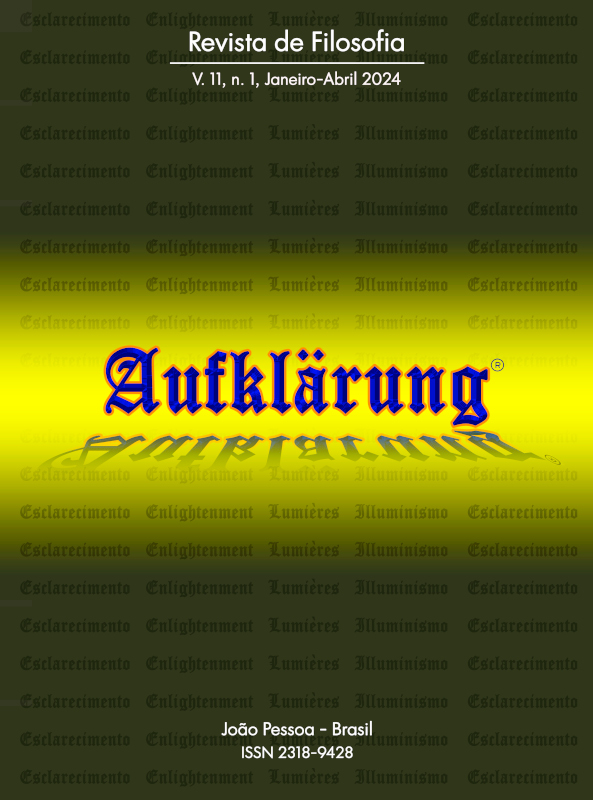Philosophical practice in Brazil: in dialogue with Gonçalo Palácios
DOI:
https://doi.org/10.18012/arf.v11i1.68354Keywords:
Brazilian philosophy, Metaphilosophy, History of Philosophy, Philosophy TeachingAbstract
This essay deals with metaphilosophical issues, i.e., different ways of “doing philosophy” and their possible applications for the formulation of a properly Brazilian philosophy. The arguments are drawn from questions that constitute the instigating and pertinent book by Gonçalo Palácios entitled De como fazer filosofia sem ser grego, estar morto ou ser gênio. In order to problematize the increasingly explored question of whether there is a Brazilian philosophy, firstly, I interact with some problems raised in the mentioned work, such as academic philosophical practice, its attachment to the exegesis of works consecrated by tradition, and the consequent subdivision between history of philosophy and “philosophizing” through specific problems of national reality. Next, I articulate some elements that allow us to characterize a specifically Brazilian philosophy. To carry out this characterization, it is essential to critically articulate the relationship between philosophy teaching, in both school and academic level, with the philosophical tradition and its adjacent concepts.
Downloads
References
ARANTES, Paulo Eduardo. Um departamento francês de ultramar. São Paulo: Paz e Terra, 1994.
DEPRAZ, Natalie. Compreender Husserl. Trad. Fábio dos Santos. 2ª Ed. Petrópolis, RJ: Vozes, 2008.
DOMINGUES, Ivan. Filosofia no/do Brasil: os últimos cinquenta anos – desafios e legados. ANALYTICA, Rio de Janeiro, vol. 17 nº 2, 2013, p. 75-104. Disponível em: <https://revistas.ufrj.br/index.php/analytica/article/view/2163> Acesso em 05 de nov. de 2022.
GLOCK, Hans-Johann. O que é filosofia analítica? Trad. Roberto Hofmeister Pich. Porto Alegre: Penso, 2011.
GONZÁLEZ PORTA, Mario Ariel. A filosofia a partir de seus problemas: didática e metodologia do estudo filosófico. São Paulo: Edições Loyola, 2003.
GONZÁLEZ PORTA, Mario Ariel. Filosofia e História da Filosofia: uma reflexão sobre as relações de texto e contexto. Cognitio Estudos: Revista Eletrônica de Filosofia. Vol. 8, nº. 2, julho-dezembro, 2011, p. 141-148.
HUSSERL, Edmund. A crise das ciências europeias e a fenomenologia transcendental: uma introdução à filosofia fenomenológica. De acordo com a Husserliana VI. Trad. Diogo Falcão Ferrer. 1ª Ed. Rio de Janeiro: Forense Universitária, 2012.
HUSSERL, Edmund. A ideia de fenomenologia. Trad. Artur Mourão. Rio de Janeiro: Edições 70, 2000.
MARCONDES, Danilo. Introdução à história da filosofia: dos pré-socráticos a Wittgenstein. 8ª Ed. Rio de Janeiro: Jorge Zahar Ed., 2004.
MARGUTTI, Paulo. Sobre a nossa tradição exegética e a necessidade de uma reavaliação do ensino de filosofia no país. KRITERION, Belo Horizonte, nº 129, Jun./ 2014, p. 397-410.
PAIM, Antonio. A filosofia brasileira. 1ª Ed. Lisboa: Instituto de Cultura e Língua Portuguesa, 1991.
PALÁCIOS, Gonçalo Armijos. De como fazer filosofia sem ser grego, estar morto ou ser gênio. Goiânia: Editora da UFG, 1997.
RITCHIE, Jack. Naturalismo. Trad. Fábio Creder. Petrópolis, RJ: Vozes, 2012.
RORTY, Richard. A filosofia e o espelho da natureza. 3ª Ed. Trad. Antônio Trânsito. Rio de Janeiro: Relume-Damaré, 1994.
SEARLE, John. A redescoberta da mente. Trad. Eduardo Pereira e Ferreira. 2ª Ed. São Paulo: Martins Fontes, 2006.
VAZ, Henrique C. de Lima. O problema da filosofia no Brasil. Síntese, n. 30 (1984). Pág. 11-25. Disponível em <https://www.faje.edu.br/periodicos/index.php/Sintese/article/view/2099> Acesso em 23 de mar. 2023.
Additional Files
Published
How to Cite
Issue
Section
License

This work is licensed under a Creative Commons Attribution 4.0 International License.
Journal general policy
1.This journal works under a Creative Commons License aplied to online journals. That icence can be read in the following link: Creative Commons Attribution 4.0 International (CC BY 4.0).
2.Accordingly to this License, a)the journal declares that authors hold the copyright of their articles without restrictions, and they can archieve them as post-print elsewhere. b)the journal allow the author(s) to retain publishing rights without restrictions.
Metadata Policy for information describing items in the repository
1. Anyone may access the metadata free of charge at anytime.
2.The metadata may be re-used in any medium without prior permission, even commercial purposes provided the OAI Identifier or a link to the original metadata record are given, under the terms of a CC BY license refered for the Journal.







































